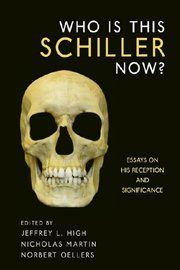Book contents
- Frontmatter
- Contents
- Foreword
- Acknowledgments
- List of Abbreviations
- Introduction: Why Is This Schiller [Still] in the United States?
- Part I Schiller, Drama, and Poetry
- Part II Schiller, Aesthetics, and Philosophy
- 6 Die Moralphilosophie des jungen Schiller. Ein, Kantianer ante litteram'
- 7 Aesthetic Humanism and Its Foes: The Perspective from Halle
- 8 Zur kulturpolitischen Dynamik des ästhetischen Spiels in Schillers Briefen Ueber die ästhetische Erziehung des Menschen
- 9 Die Empfänglichkeit für den ästhetischen Schein ist das a priori des Schönen in Kants Kritik der Urteilskraft. Das Orientierende in Schillers Forderung der ästhetischen Erziehung des Menschen
- 10 Energy and Schiller's Aesthetics from the “Philosophical” to the Aesthetic Letters
- 11 “Making Other People's Feelings Our Own”: From the Aesthetic to the Political in Schiller's Aesthetic Letters
- Part III Schiller, History, and Politics
- Part IV Schiller Reception — Reception and Schiller
- Part V Schiller Now
- Notes on the Contributors
- Index
6 - Die Moralphilosophie des jungen Schiller. Ein, Kantianer ante litteram'
from Part II - Schiller, Aesthetics, and Philosophy
Published online by Cambridge University Press: 05 February 2013
- Frontmatter
- Contents
- Foreword
- Acknowledgments
- List of Abbreviations
- Introduction: Why Is This Schiller [Still] in the United States?
- Part I Schiller, Drama, and Poetry
- Part II Schiller, Aesthetics, and Philosophy
- 6 Die Moralphilosophie des jungen Schiller. Ein, Kantianer ante litteram'
- 7 Aesthetic Humanism and Its Foes: The Perspective from Halle
- 8 Zur kulturpolitischen Dynamik des ästhetischen Spiels in Schillers Briefen Ueber die ästhetische Erziehung des Menschen
- 9 Die Empfänglichkeit für den ästhetischen Schein ist das a priori des Schönen in Kants Kritik der Urteilskraft. Das Orientierende in Schillers Forderung der ästhetischen Erziehung des Menschen
- 10 Energy and Schiller's Aesthetics from the “Philosophical” to the Aesthetic Letters
- 11 “Making Other People's Feelings Our Own”: From the Aesthetic to the Political in Schiller's Aesthetic Letters
- Part III Schiller, History, and Politics
- Part IV Schiller Reception — Reception and Schiller
- Part V Schiller Now
- Notes on the Contributors
- Index
Summary
Schiller's early writings demonstrate an increasing interest in the problem of moral foundation, in which the metaphysical claim to eternal reward or punishment and the egoistic core of eudemonistic ethics are the major obstacles to the purity of virtue. Schiller became aware of this problem long before he started reading Kant. In the “Philosophisches Gespräch” (Philosophical Dialog, 1789) Schiller specifically pursues an earthly, non-egotistical principle of virtue. During his so-called Kantian break, beginning in 1791, Schiller eschewed literary and poetic work and studied Kant's Critiques, but accepted only those Kantian arguments that supported revised solutions to problems addressed in his earlier works. In this sense, Schiller is not a Kantian, but a “Kantian ante litteram.”
WAR FRIEDRICH SCHILLER EIN KANTIANER? Diese Frage hat die philosophische Rezeption von Schillers Werk von Anfang an gekennzeichnet und ist noch heutzutage alles andere als unumstritten. Man ist dabei bedenkenlos von der Annahme ausgegangen, nur die zu Schillers sogenannter philosophischer Phase gehörenden Schriften seien zur Beantwortung dieser Frage heranzuziehen und genügten zum korrekten Verständnis von Schillers Verhältnis zu Kant. Erst in den letzten Jahrzehnten sind wichtige Beiträge zur philosophischen Entwicklung des jungen Schiller1 und zur Tiefe von Schillers Kant-Kritik geliefert worden, die eine neue Epoche in der Schiller-Forschung versprechen. Wesentlicher Bestandteil dieser neuen Perspektive ist die Berücksichtigung von Schillers jugendlichen Schriften, durch die allein sein philosophisches Profil umrissen werden kann. Nur eine solche “genetische” Untersuchung ermöglicht eine bewusste Erwägung der Gründe, aus denen sich Schiller Kants Philosophie aneignet, nur eine solche entwicklungs geschicht liche Analyse hilft bei der Antwort der anfangs gestellten Frage, ob Schiller ein Kantianer sei.
- Type
- Chapter
- Information
- Who Is This Schiller Now?Essays on his Reception and Significance, pp. 99 - 115Publisher: Boydell & BrewerPrint publication year: 2011

